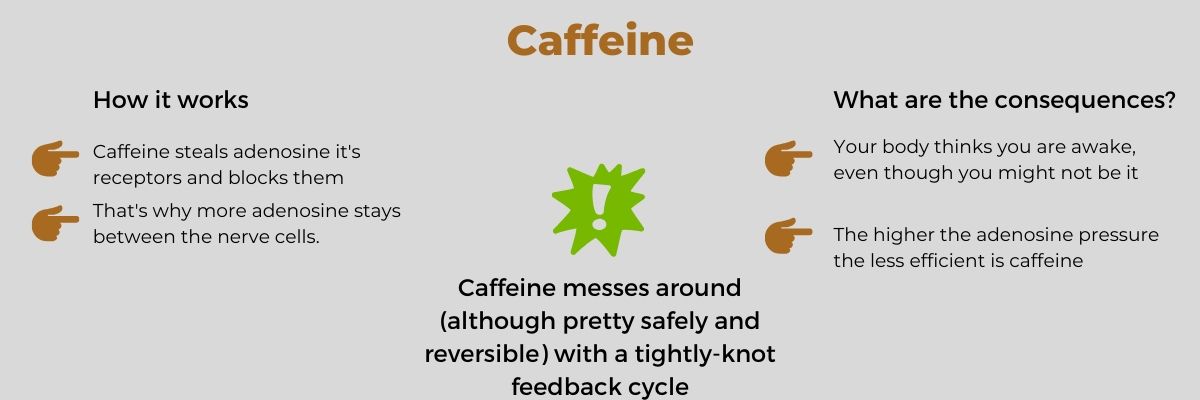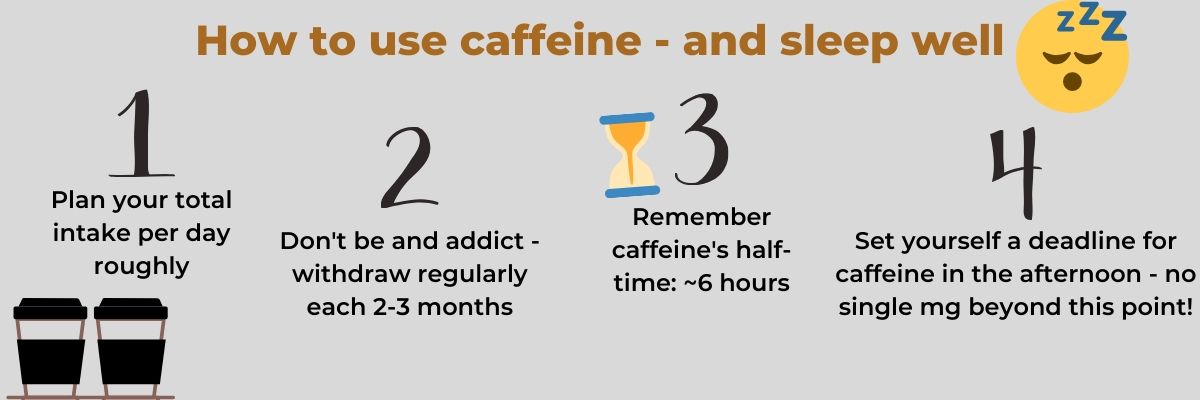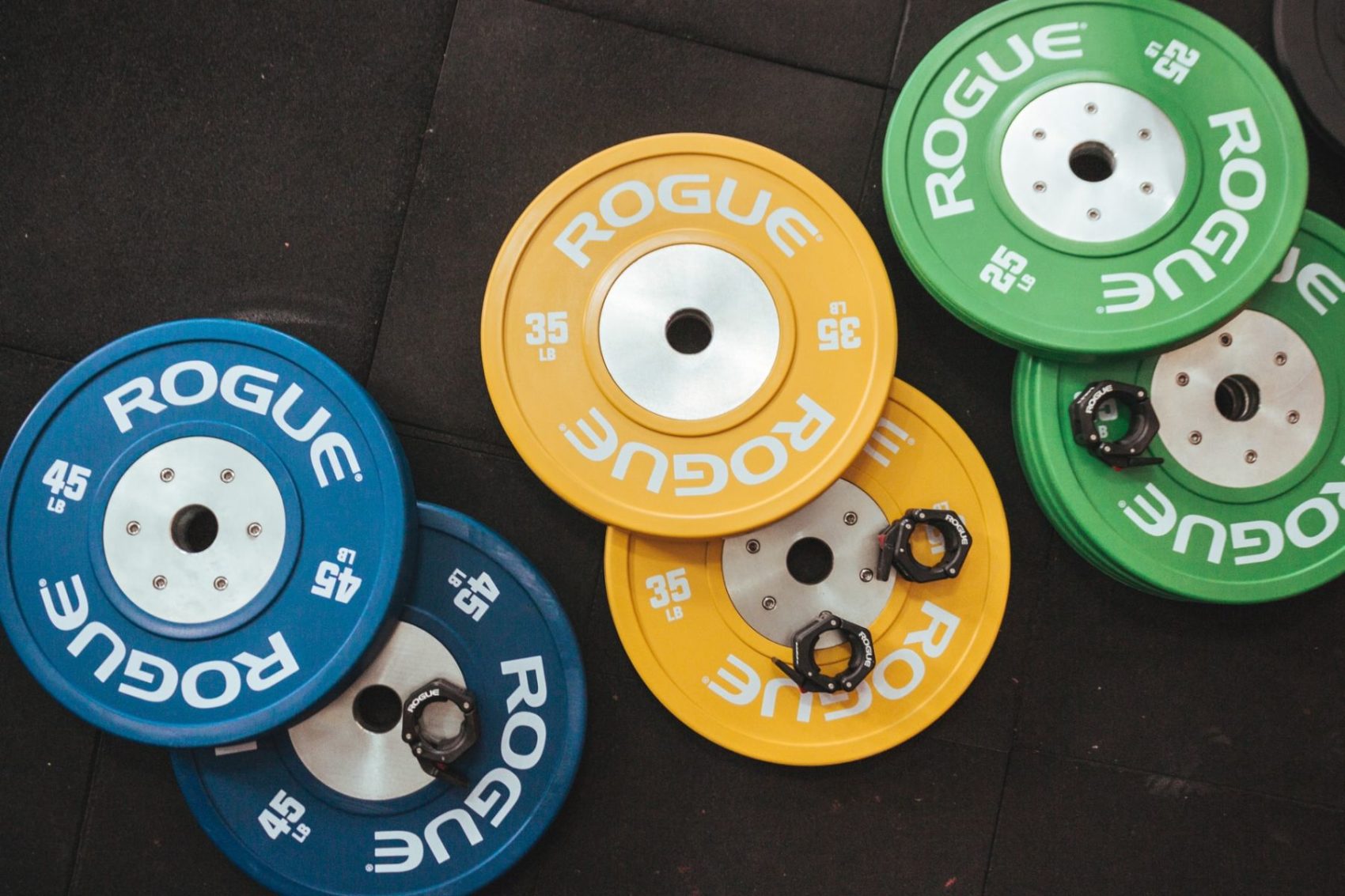EVERYONE knows caffeine and its effects. Nearly 90% of the westernized society consumes it daily in some form. Shocking isn’t it?1
The whole world is on this drug.
That’s why it makes total sense to learn something about it. And how could you do that any better than within a brief infopost? Because of this widespread use, understanding the mechanisms and systems influenced by caffeine is very important to know, even for the layman. Even more, stunningly caffeine has a dark side, and by that, I do not mean insomnia because of improper timing – but other metabolic issues very few people talk about. With all of that knowledge armed, you can make a very educated decision about how you want to approach caffeine within your life. I for my part swore of caffeine half a year ago. It was the best, yet toughest decision for me. I love coffee, good espresso, and the like, but my body doesn’t respond well to the alkaloids and mycotoxins – a sacrifice for health if you like. But I could only get there because I knew about caffeine’s properties and effects. This post shall help you get in the same position!
Caffeine as society’s beloved drug
In the beginning, caffeine* was widely unaccepted and even prohibited by law. Nowadays, this drug couldn’t be deeper rooted within our society:
- You go on a date to drink coffee – even if this might be a shallow pretext – at least from time to time. 👿
- You meet to talk about business while drinking a cup of coffee.
- You socialize and meet your grandparents to coffee and cake2

Or differently said – caffeine is a solidified part of many’s day-to-day lives. Plus, various people are seriously addicted to caffeine. Just consider how many aren’t in the mood to talk one sentence before having a cup after waking up. I’ve been there, too
Could you imagine a world without coffee, energy drinks, or even tea? I couldn’T industries and whole sectors would collapse.
Although it is a drug, caffeine is the single most, widely accepted drug worldwide. A beautiful stimulant, the fuel of our economy.3
Caffeine’s hard facts
Teein, found in tea, accompanies us, humans, now for quite a while, especially in Asia and South America. Coffee seems to be the new kid on the block. If we look at the substance it is a plant defense molecule, called a phytoalexin, made by many plants from xanthine. Especially coffee beans, cocoa beans, tea leaves, and some other plants make substances from this family. Two other commonly known, and consumed, xanthine alkaloids are theobromine and theophylline. Both occur more plentiful in products from the cocoa bean.
Caffeine is nothing more than a stimulant. As a supplement, caffeine increases performance, tightens your blood vessels, and ups your heart rate. Let’s have a look at how this works physiologically!
The Adenosine Cycle
All these reactions happen within your sympathetic nervous system. Caffeine blocks the receptors of adenosine.
And blocked adenosine receptors mean that more adenosine can remain between two neurons – within the synaptic gap.

Ok – now you might think, what’s adenosine good for?
Glad you asked! Adenosine signals your body his energy levels. The longer you stay awake the higher these levels will rise and signal your body that you are tired. That’s the mechanism know as sleeping pressure.
Sleep reverses this process and recycles adenosine.
How Caffeine messes this Cycle up
By consuming caffeine you fuck around within this tightly-knot cycle:
- By blocking the adenosine receptors your body thinks it is still fit and ready to do stuff
- Even if you aren’t and your adenosine levels normally would tell it to slow down.
This is why coffee lets you feel wake. You can’t play this game forever – if there is too much adenosine, there is simply no amount of caffeine that could win this battle.
Ever tried to stay 2 nights up in a row just aided by caffeine? Each cup helps less and simply makes you a more confused mess.4
Caffeine Addiction
Funnily your body is a genius. It copes with caffeine and simply builds more receptors to bypass this inhibitory process. Bloody genius, isn’t it?
That’s the reason why you quickly get used to caffeine and can tolerate more and more. You simply need a higher dose for an equal effect. As with any drug, Paracelsus law is valid – the dose determines the effect and creates the poison:
- Our body gets used to this substance and even needs it to fill all these additional receptors. You get addicted. And sometime later you can drink 2l coffee for breakfast while feeling slightly awake.
- Your colleague drinking rarely a cappuccino would get killed by that dose or tear off his breakfast table, trying to stuff breakfast cereal trembling into his mouth.
One last important fact to know is caffeine half-time of 5-8 hours, depending on the individual. That means that if you down 200mg of caffeine 5 hours before bedtime, you still got 100mg of caffeine actively within your bloodstream pumping you up.

4 Rules to use Caffeine efficiently
Don’t be an addict
Check that your tolerance is in an acceptable range. If you can drink 1l of coffee and feel slightly awake or each coffee just adds to your overall confusion – it is time for cold withdrawal. The confusion-benchmark is always for me a sign of the devil to back up.
Take a week off and consume NO caffeine – no coke, no green tea, no black tea. After this week, your body will reduce its total amount of receptors, back to the norm. It’s unbelievable how quickly this works!
And – it’s not that bad. Some headache, a bit of confusion, that’s it. But afterwards you’ll definitely feel each cup of coffee again and they’ll taste much better. Life can happen without caffeine – I wouldn’t have thought that, too. Pro Tipp: Don’t try to keep up with your caffeine intake pre-withdraw – that’s not a good idea. Use smaller scoops or cups on intent to avoid your heart from pounding out of your chest.
No coffee past ~13:00
If you wanna transition well into sleep and have the best out of doing so, try to eliminate caffeine at least 6 hours before bedtime, an even better number would be 8-9 hours. If you want to sleep at 22:00 this means no caffeine after 15:00 or even better 13:00.5
Think of its half-time. If you take a total amount of 300mg caffeine pre-workout at around 18:00, this will be equivalent to 225mg at 21:00 or 150mg at midnight. That’s the equivalent of a whole cup of coffee. While there are some people able to sleep while on caffeine – others like me are going to have a rough night ahead.
Plan roughly your caffeine intake per day
Drinking your caffeine each day at roughly the same time enables you to plan your intake well.
For example, drink 2 coffee in the morning and 1 after lunch. This way you are productive in the morning, not totally dead after eating, and can sleep well.
By doing so you make sure that you never exceed around 100mg of caffeine within your bloodstream in the evening. As a seasoned addict this shouldn’t be an issue when trying to sleep.
Use Caffeine pre-workout, but prefer liquids to the pure substance
Coffee and energy drinks, as well as pure caffeine pills*, have a place as quick wake-up kicks. You can get the most out of them if you use them before working out. Preferably, combined with L-Theanine, but later on more on this combination and its synergistic effects.
Many studies have shown that caffeine is THE performance-increasing supplement. And this day in, day out. It is safe to use, has no severe side effects, and being caffeine-addicted is by any means better than being addicted to any other drug.
Tea contains caffeine, too, but in a slightly different form. It is bound, that’s why teein’s effect is softer.6 It awakens like coffee but keeps you calm. I found this effect great to work focussed. It is very different from the brute and sometimes confusing kick raw caffeine produces.

The Effects of Caffeine on Athletic Performance
Caffeine is the single-greatest performance-increasing supplement for the everyday athlete.7 It is very compatible and increases performance, as well as focus to a comfortable amount.
I would take around 100-200mg Caffeine pre-workout. Start slowly and look at how much caffeine your body can sustain. Having way too much caffeine pre-workout is no fun – and keep in mind that caffeine just makes you feel awake – you aren’t truly more awake. It tricks out your body’s energy systems. Saying that there is a fine line to walk of pushing through it on intent or trashing yourself relentlessly every workout.
If you are used to it and really feel drained or wanna hit a PR the upcoming session, caffeine can be a really great motivator. Although solely relying on it and pushing through each time you are fatigued, isn’t the right thing to do either. Knowing your body, if you are just sleepy or severely overtrained, is definitely a nice skill to acquire.
Combine Caffeine and L-Theanine
One final tip is to combine caffeine with the same amount of L-Theanine*. Why is this useful?
Caffeine and L-Theanine* enter in a synergistic relationship with each other – what means that they positively alter each other’s effects. It’s like drinking while on painkillers – you can save a lot of money by getting hammered solely from downing a few beers. Jokes aside. While caffeine pushes you and makes you jiggly on the side, or felt driven and confused, l-theanine manages to relieve the effects of caffeine from these unpleasant ones.
L-Theanine* calms the caffeine’s effect and turns it more into a deep focussed state. That’s where the scientific name of this combination came from ‘calm focus’. Give it a try and see if it helps you if you avoid caffeine because of the unpleasant side effects.
The Dark Side of Caffeine
Histamine-Intolerance through DAO-Inhibition

This is a banger of a headline, right? Let’s unpack this statement:
Histamine is a substance9 metabolizes histamine. Certain substances such as the xanthine alkaloids (caffeine, theobromine, theophylline, …) inhibit DAO and can create histamine-intolerance symptoms in that manner. I for example had to fight for years on end with histamine-intolerance symptoms like eczemas, allergies and a congested nose – I cut out everything that could trigger it, an Animal-Based Diet naturally helped me with that. But it still persisted until I found out that xanthine alkaloids can inhibit DAO. After giving up caffeine these last remaining issues vanished into thin air.
Mycotoxins
Mycotoxins are toxins created by molds to poison their environment. So why do these guys do that? They want to avoid other types of mold growing in the area that they inhabit and have it all for themselves. That we get harmed is just collateral damage. There is a wide range of mycotoxins literally everywhere around us, especially housing is a big one. The other one is nutrition – certain foods like cereal, bread, and other storage grains, but also coffee have been found rich in a variety of mycotoxins.
This is not good as mycotoxins are linked to many superfluous conditions ranging from brain fog, neurotoxicity, cancer death of neurotransmitters, to full-fledged depression. A way to get around this is to buy mold-free coffee brands that test their products – nonetheless, you still get exposed to the other 2 issues.
Acrylamide
Acrylamide is a substance that gets created if you heat up foods containing the amino acid asparagine and some sugars. It is a deterioration product of asparagine. 10https://www.cancer.gov/about-cancer/causes-prevention/risk/diet/acrylamide-fact-sheet[/efn_Note] Within our lives we get exposed to it through overcooked foods and tobacco smoke. Regarding foods, it is especially present in fried foods, cereal, bread, crackers, and coffee. It is the reason why every mother tells their children to not eat the burnt parts of meat and the like.
Within our bodies, acrylamide damages DNA and is linked to several types of cancer and neurological damage. Not a good thing, by any means.
How do you handle caffeine?
I hope you could take something out of this post for your very own use of caffeine. Although it is a widespread drug it stays what the name suggests – a drug.
And likewise every other drug you should at least know what it is, to estimate your usage wisely. No one would (hopefully) down every pill their doctor gives them without informing oneself what this freaking pill exactly is. Unfortunately, while I worked at a hospital this was rather the default condition than the extraordinary. Let’s make it better and understand what other people want us to do. Most often people and professionals, especially medical ones, want the best for you and are sincerely good. But every time in a while someone wants to screw you over for their benefit. And these cases are where self-driven information and a bit of pessimism come in handy – to kick the other party’s ass (verbally).
- How is your personal usage of it?
- Is caffeine* in your trusted supplement arsenal to increase your performance when it’s needed?
While statistically there should be a few people who don’t consume caffeine regularity I had a hard time finding one – besides my brother. Are you in team caffeine, too?
Alright and till then my dear junkies,

Footnotes
- For more information on how common caffeine nowadays really is – check this interesting article out!
- Ok – maybe not in this weird corona pandemic times.
- Oh dude, I could find 1000 aphorisms for coffee and fill this entire post just with them.
- https://www.ncbi.nlm.nih.gov/books/NBK209050/
- https://jcsm.aasm.org/doi/10.5664/jcsm.3170
- This is so for a few reasons. Part of it is the bound caffeine, another is the occurrence of l-theanine within tea leaves, as well as catechins.
- Within this giant meta-analysis the effects of targeted supplementation of caffeine on performance were researched.
- https://www.webmd.com/diet/foods-high-in-histamine#:~:text=Histamine%20is%20a%20chemical%20created,%2C%20mold%2C%20and%20certain%20foods.[/efn_Note] involved in your immune defense and is released when your body tries to defend itself from foreign molecules. This can often happen over the edge, like in allergies. Then you overreact to harmless substances.
But there can also be histamine intolerance, either by consuming too many histamine-rich foods, or by having problems metabolizing it. The enzyme Diaminooxidase (DAO)8https://www.ncbi.nlm.nih.gov/pmc/articles/PMC6859183/




